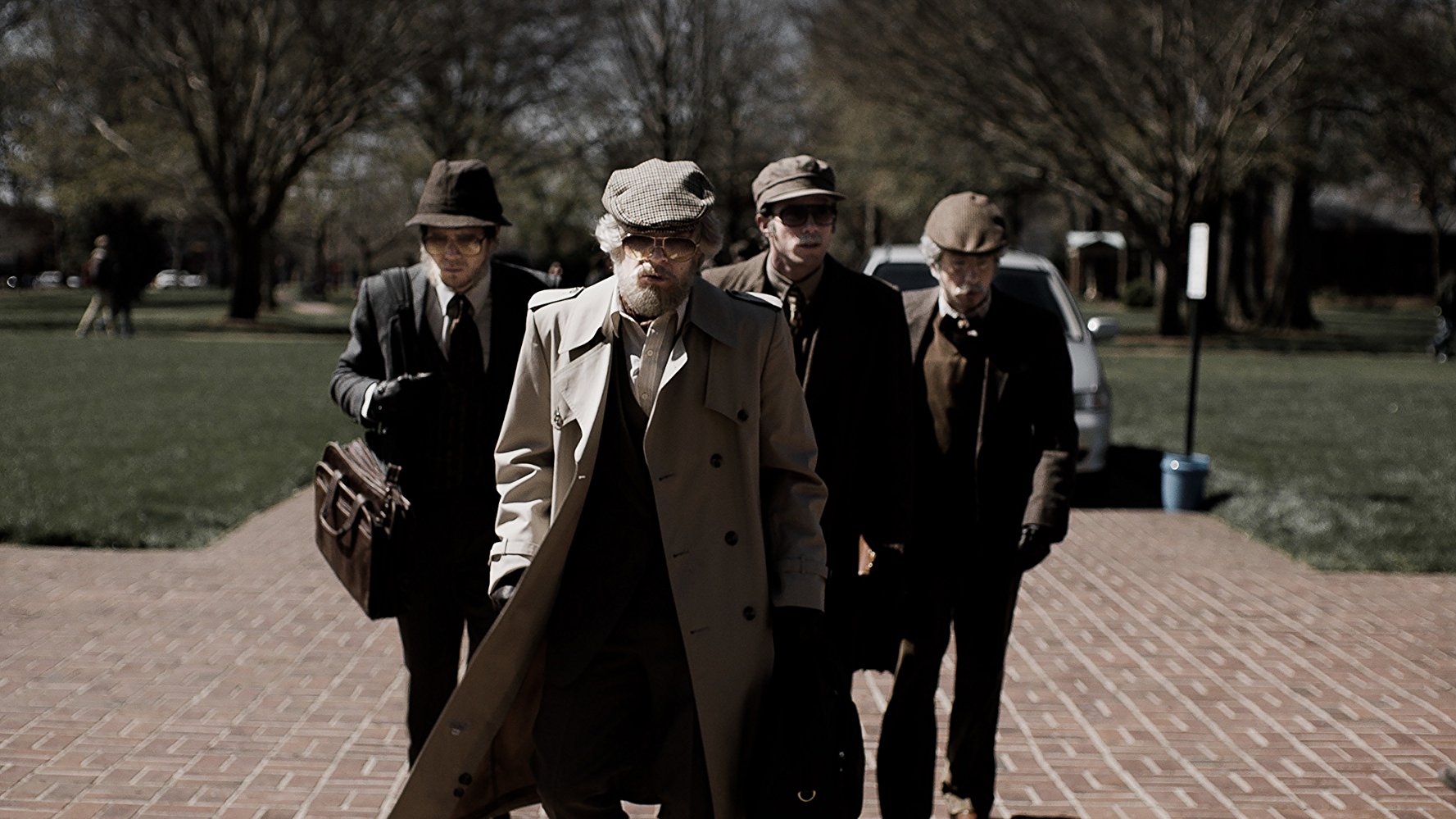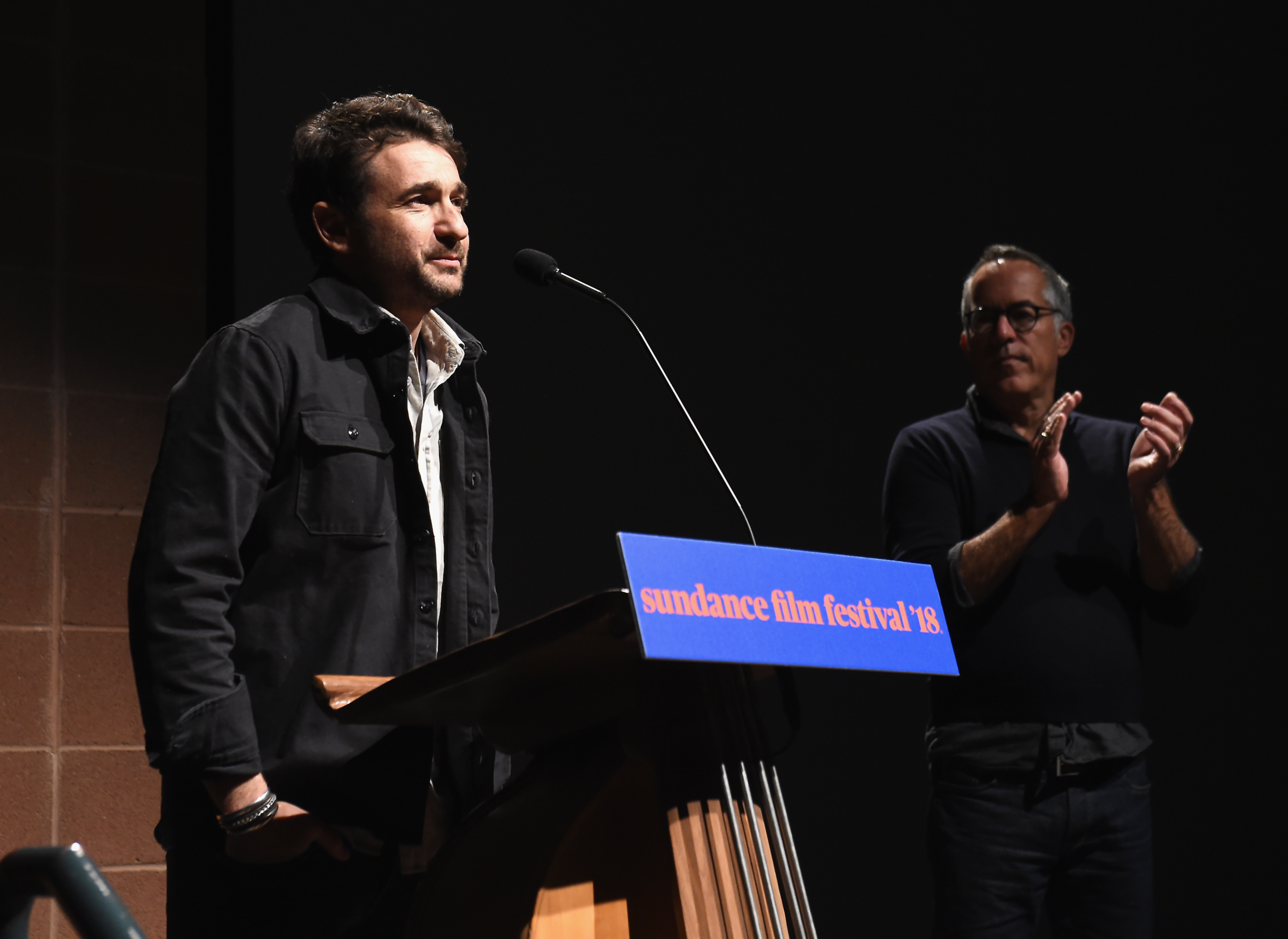
- Festivals
Sitting Down at Sundance With the American Animals
In 2012 British filmmaker Bart Layton presented his documentary The Imposter at Sundance. It ended up winning a BAFTA Award for Outstanding Debut later that year. Layton is back at the festival with another debut, his first work of fiction: American Animals, which curiously walks a fine line between the two worlds. The film fictionalizes the case known as Transy Book Heist in which four college students stole a rare book from the library collection of Kentucky University in 2004. The story is fictionalized, but the actual protagonists appear in the film alongside the actors who play them. After a warm reception at the world premiere at the Eccles Theater, we sat down with Layton to talk about the film, as well as with Barry Keoghan (The Killing of a Sacred Deer) , Evan Peters (X-Men), Blake Jenner (Glee) and Jared Abrahmson (Travelers) the four actors playing the robbers.

Director Bart Layton (L) speaks onstage with Director of Sundance Film Festival John Cooper at the American Animals Premiere during the 2018 Sundance Film.
getty images
So how was your feeling after the first screening at the festival?
Bart Layton: I think we all feel pretty good actually. These two haven’t seen it before, so it was a big experience for them seeing it in that environment with that audience. And I was nervous as to how they were gonna take to it, which is obviously the highest obviously on my list of people I want to feel pleased with it. And so, everyone, yeah, I think we all feel good. The reaction in the room and afterwards was pretty great.
Jared Abrahmson: You read the script and you perform it, but seeing it cut and hearing the music and all the sound design and everything like that, to see the whole thing.
Barry Keoghan: And to keep you engaged. I think it’s one of those films that it gets better as it goes. It really does.
Blake Jenner: I had already seen it once before, but it was the exact same feeling I got. And once everything picks up, my heart would just start beating. I was on the edge of my seat, and so proud.
And how was the fact that the four real guys were in the audience watching it with you?
JA: It was trippy because they were sitting there right in front of me. And I am sitting there watching it and I was pulling on my beard, choking my beard and I looked down, and Eric, the guy I am playing, he’s doing the exact same thing. (laughter) And I was like, it’s too close. (laughter)
BL: I had shown them the film before I had finished cutting it, before we locked it, because I thought that if they had anything that they objected to, it would be difficult since we have a certain responsibility towards them, it’s their story and they are in the film. And I feel they made some very serious errors and they really paid the price of that. I wasn’t going to give them any editorial control, but it was important that they felt that it was accurate. And they all watched it individually on their own and they felt that it was very true to their experience and their memory. And that, I think, made it easier for us to know that sitting in the audience, there weren’t going to be any surprises for them.
So, besides the obvious participation in the film of these four, were they in touch with you guys and did you talk to them?
Evan Peters: I reached out to Warren. I violated the rules (laughter) as Warren would have done and found him through Twitter actually.
BL: I wanted them to find their characters in the script, and not worry about the real guys, because they aren’t the same people that they were then. But Evan was channeling Warren, who obviously hasn’t really obeyed the rules, so he made contact with him, and I can totally understand that, because he wanted to know what he sounded like and felt like and have access to some of that.
EP: But Bart supplied us with clips and even more than that, to sort of see how they spoke and the personality and you could see from the film and to me, Warren is the star of the film. And he gets the biggest laughs and he has the saddest moments with their remorse about hurting BJ. He’s a trickster.
Bart, did you work on this as a documentary in the beginning?
BL: A little bit. You hear about the story, you want to understand what more there is to it than just what is on paper. And so, we began a correspondence with them, some phone calls, emails and some actual letters that were written back and forth, while they were in prison and that is how it started. And I started writing a script based on that. And then when they were out of prison, we sat down and we did some interviews, which we filmed. And that changed the script again. But it wasn’t really ever approached in the way that you would approach a documentary and it was always going to be a narrative fiction film, but with these small non-fiction elements.
Did you have doubts about how close to a documentary you could get?
BL: It was always a bit of an experiment. I felt like, I had a good sense that it would work, and I also had a sense that we are now in a place where audiences are very sophisticated with how they watch films. We are in a post-YouTube world where you say, ‘based on a true story’, and then you see Michelle Williams playing Marilyn Monroe. Well, we know it’s not Marilyn Monroe, but we are still up for it.
This movie is really full of testosterone, but I wondered how were the scenes with the Golden Globe winner Ann Dowd?
BJ: She was incredible. She is a lovely person and that just made it all the more difficult to have to take her down to the ground, which we were all concerned about and we didn’t want to hurt her at all. But yeah, it was intense. And then you flip her over and she is looking at you in the eye like that, it’s hard not to react to her face as the actual Ann. And I think it just helped so much with the character and what he was going through in that moment.
BK: And she is such a mommy on set as well.
BL: Yeah, she is a spectacular actor, and a human being.
Was that a real library? Was that a set?
BL: It was a real library, in a real university, and we took the special collection room in which the books were kept, and we sort of turned that into a set. We paneled it with wood and had this phenomenal young production designer called Scott Dugan who, everything that anyone had said was impossible, he went no, I will just do that. It was a real place, but we needed to make it feel slightly different, more austere. As soon as you went into it, it felt like the temperature and the lighting are controlled and it’s not a place where violence should occur.
And the real book, did you have any access to it?
BL: Scott, the production designer, went to Yale, where they have the book, and took photos of the display case and the book itself and he re-created them exactly. And the weight of the book was the same as the weight of the real book.
How much leeway did the actors have to create their own characters in this film?
BJ: A lot. Bart was very open to our ideas. We did all the homework, and we watched the necessary things in preparing, but then he gave us all the freedom to kind of explore on the set.
BL: Some of my favorite lines in the film are things that these guys wrote on the day that I didn’t write. That was one of the best things about rehearsal, is that I would just sit there and throw things in. There’s a couple of lines that I would love to take credit for, but these guys, and particularly Evan, are all masterful improvisers. So that is when you just get magical stuff that you just didn’t expect. That is the most close to documentary, if you can create that environment where that can happen.
How difficult was the casting, because they had to really look like the other ones?
BL: That is really a coincidence actually. Because the truth is, they don’t really look like them. We used wardrobe, the hair and glasses and I think you get to a place where in your mind, the two things kind of merge together, even though physically they are so similar. But the casting, it was to find the best actors on the planet. We had the opportunity of casting some of the biggest names in that age bracket, and that definitely wasn’t what I intended to do.

